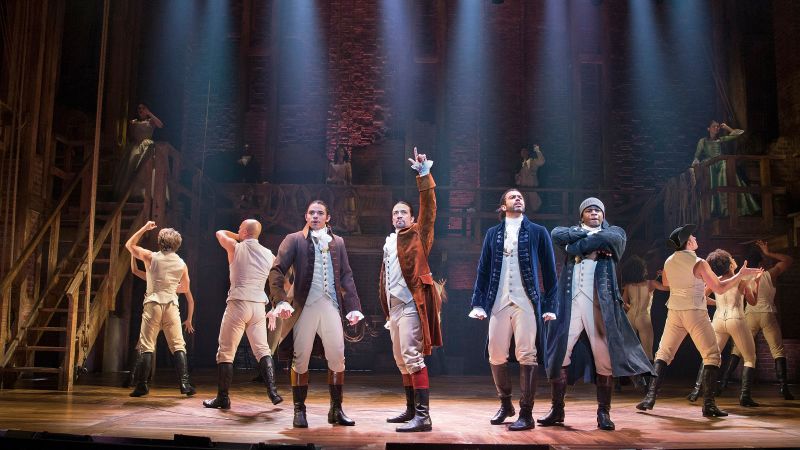The smash hit Broadway show "Hamilton" took to the stage 10 years ago and quickly became a global phenomenon. Inspired by Ron Chernow's biography on Alexander Hamilton, the musical tells the story of the Founding Father's life and involvement in the American Revolution. The titular role was first played by creator Lin-Manuel Miranda, who blended hip-hop and other musical styles while casting mostly black and Latino performers.The show was met with both box-office and critical acclaim, winning 11 Tony Awards, a Grammy and a Pulitzer Prize for Drama. The original cast will reunite for a special performance at the Tony Awards on Sunday.
In pictures: 10 years of ‘Hamilton’
TruthLens AI Suggested Headline:
"Hamilton Celebrates 10 Years of Impact on Broadway and Cultural Discourse"
TruthLens AI Summary
The Broadway musical "Hamilton," which premiered a decade ago, has established itself as a remarkable cultural phenomenon. Inspired by Ron Chernow's biography of Alexander Hamilton, the show chronicles the life of the Founding Father and his significant contributions during the American Revolution. Lin-Manuel Miranda, the creator of the musical, initially took on the titular role, infusing the production with a unique blend of hip-hop, R&B, and traditional musical styles. The innovative casting choices, featuring predominantly black and Latino actors, not only redefined the portrayal of historical figures but also made a powerful statement about representation in theater. The musical's groundbreaking approach to storytelling resonated with audiences, leading to both critical acclaim and strong box office sales. Over its ten-year run, "Hamilton" has garnered an impressive array of accolades, including 11 Tony Awards, a Grammy Award, and the Pulitzer Prize for Drama, solidifying its legacy in American theater history.
In celebration of its tenth anniversary, the original cast of "Hamilton" is set to reunite for a special performance at the upcoming Tony Awards. This event is anticipated to evoke nostalgia among fans and highlight the musical's enduring impact on contemporary culture. The reunion will not only serve as a tribute to the show's success but also reflect on the significant conversations it has sparked regarding history, race, and the American identity. As "Hamilton" continues to be performed in various productions around the world, its influence on both the musical theater landscape and broader societal discussions remains profound. The show's ability to connect with diverse audiences through its innovative storytelling and relatable themes ensures that it will remain a pivotal work in the arts for years to come.
TruthLens AI Analysis
The announcement of the 10-year anniversary of "Hamilton" serves multiple purposes, highlighting the show's impact on culture and society. As a prominent piece of American theater, it aims to celebrate diversity and the blending of musical genres.
Cultural Impact and Perception
This news seeks to reinforce the perception of "Hamilton" as a transformative work that reshaped Broadway with its innovative storytelling and diverse casting. By focusing on its achievements, such as the Tony Awards and Pulitzer Prize, the article aims to solidify its legacy in American culture. The reunion of the original cast at the Tony Awards adds a layer of nostalgia and excitement, appealing to fans and newcomers alike.
Hidden Agendas
While the article primarily celebrates "Hamilton," it may also divert attention from ongoing issues in the theater industry, such as representation and equity beyond the stage. By focusing on a success story, it could obscure the challenges faced by lesser-known productions that may lack similar recognition and support.
Authenticity of the Content
The article is based on factual events, such as the show's history and accolades. However, the way it presents this information can create a biased perspective that glorifies the musical without addressing its complexities or the broader theatrical landscape.
Connection to Other News
In the context of current discussions around representation and diversity in media, this article aligns with a growing trend of celebrating inclusive narratives. It may connect to other articles discussing diversity in the arts, potentially creating a narrative around the importance of such representations in various sectors.
Industry Image
The media outlet's focus on "Hamilton" reflects a trend in the theater industry that values mainstream success and recognition. It helps to promote an image of Broadway that is vibrant and inclusive, despite underlying issues that may not be addressed in this celebratory context.
Potential Societal Effects
The celebration of "Hamilton" could inspire further interest in theater, potentially boosting ticket sales and encouraging new productions that reflect diverse stories. It may also impact public discourse on race and representation in the arts, prompting audiences to demand more inclusive narratives.
Target Audience
The article is likely aimed at theater enthusiasts, educators, and those interested in cultural discussions. By celebrating a widely recognized musical, it appeals to a broad audience while specifically resonating with communities that value diversity in storytelling.
Economic Implications
While the article does not directly discuss financial matters, the success of "Hamilton" can influence the broader theater market. Increased interest in the show could lead to higher ticket sales for related productions and bolster the economy surrounding the arts.
Geopolitical Considerations
The news about "Hamilton" does not have direct geopolitical implications, but its themes of revolution and identity resonate with ongoing discussions about social justice and historical narratives in the U.S., linking it to current events regarding race and equality.
Use of Artificial Intelligence
There is no clear indication that artificial intelligence was used in the creation of this article. However, if AI were employed, it might have shaped the narrative to emphasize the show's accomplishments while glossing over critiques, thus influencing public perception.
The overall reliability of the article is grounded in factual reporting of "Hamilton's" achievements, yet its potentially manipulative framing could shape a narrative that celebrates success while omitting critical discussions about the state of the theater industry. The celebratory tone may lead some readers to overlook ongoing challenges faced by artists and productions outside the mainstream spotlight.
